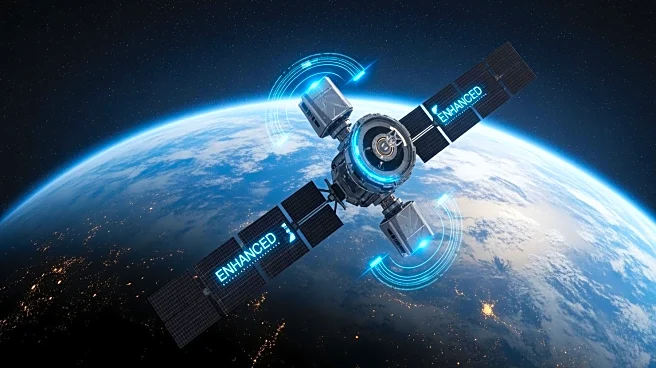What's Happening?
The Space Force has awarded a contract to Vantor, formerly known as Maxar Intelligence, to provide in-space observations and analysis. This initiative aims to enhance the Space Force's ability to track
high-interest objects in space, particularly those located in blind spots that are inaccessible to ground-based sensors. Vantor will utilize its existing satellites, which are capable of non-Earth imaging, to deliver detailed imagery and analysis of these objects. The satellites can shift focus from Earth imaging to in-space imaging without burning fuel, using inertial systems for repositioning. This contract is part of a broader strategy by the Department of Defense (DoD) to incorporate in-space monitoring into its tracking capabilities. Vantor has also secured other contracts, including the Commercial Collision Avoidance Gap Pathfinder program and participation in the Space Development Agency's Tools, Applications, & Processing Lab for domain awareness.
Why It's Important?
The contract with Vantor represents a significant advancement in the Space Force's monitoring capabilities, allowing for more comprehensive tracking of objects in space. This development is crucial for national security, as it enhances the ability to monitor potential threats and manage space traffic effectively. The use of in-space monitoring can provide more accurate data on the location, velocity, and maneuvers of objects, which is vital for collision avoidance and strategic planning. As space becomes increasingly congested with satellites and debris, the ability to track and analyze objects in real-time is essential for maintaining safe and secure operations. The expansion of Vantor's in-space monitoring business also indicates a growing market for space-based observation services, which could lead to further innovations and investments in the sector.
What's Next?
Vantor plans to expand its in-space monitoring capabilities, aiming to collect up to 1,000 non-Earth imaging images per day by 2026. This expansion will likely enhance the Space Force's ability to monitor space activities and improve its strategic operations. The continued growth of Vantor's business in this area suggests that more contracts and collaborations with government agencies could be forthcoming. As the demand for space-based monitoring increases, other companies may also seek to enter this market, potentially leading to increased competition and technological advancements. The Space Force's focus on improving its monitoring capabilities may also drive policy changes and investments in space infrastructure to support these initiatives.
Beyond the Headlines
The contract with Vantor highlights the evolving nature of space operations and the increasing importance of in-space monitoring. This shift reflects broader trends in the defense sector, where real-time data and advanced analytics are becoming critical components of strategic decision-making. The ability to monitor objects in space with high precision could also have implications for international relations, as countries seek to protect their assets and maintain space security. Additionally, the use of commercial satellites for military purposes raises questions about the balance between commercial and defense interests in space, potentially influencing future regulatory and policy decisions.











